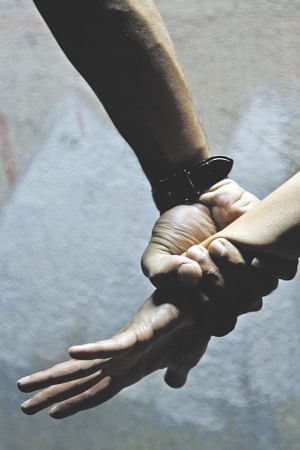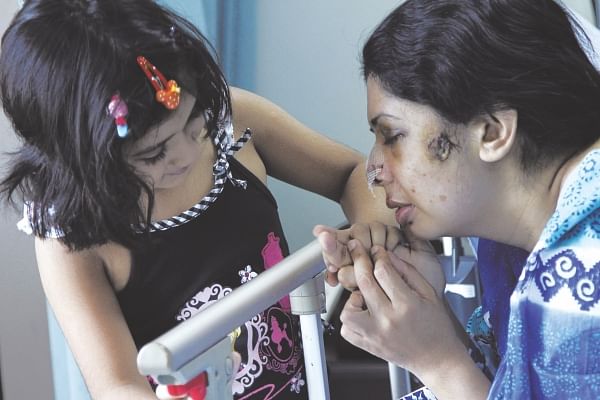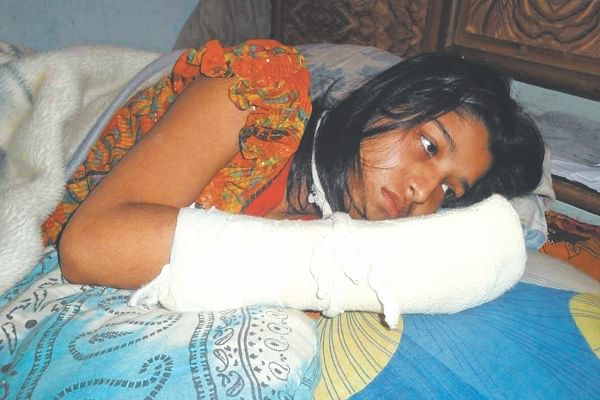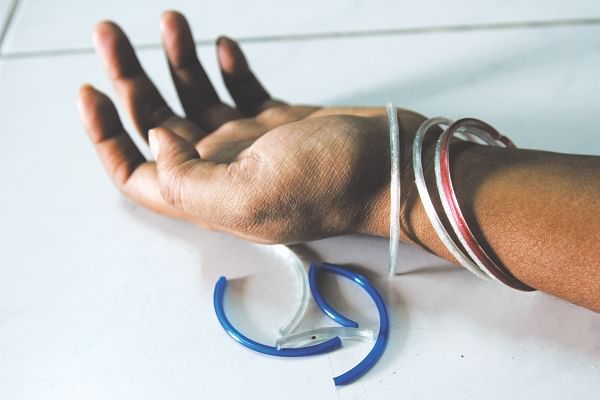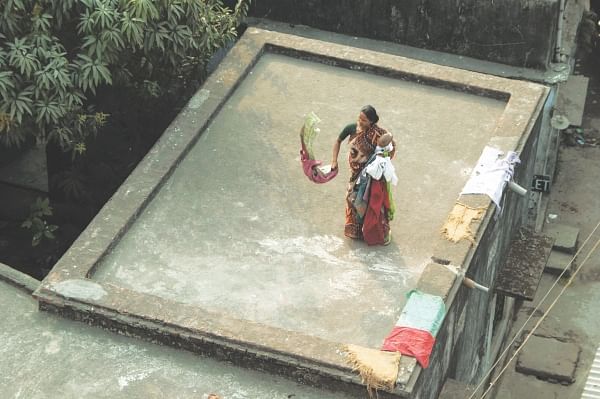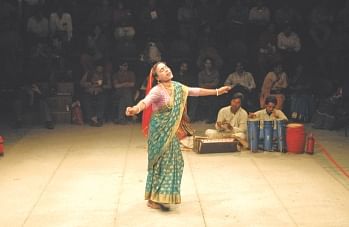| Home - Back Issues - The Team - Contact Us |
 |
| Volume 11 |Issue 02| January 13, 2012 | |
|
|
Cover Story
THE ENEMY AT HOME The word violence is usually defined in dictionaries, as “An unjust or unwarranted exertion of force or power, as against rights or laws, especially such as tends to overawe or intimidate.” We often fail to derive the full meaning of “force” and “power”, from this definition, mistaking them to mean only physical harm or injury. In reality, violence is a shape shifter of sorts, and while some forms of violent behaviour can be recognised from the outset, others are far subtler and tend to seep into our lives gradually turning our very existence into a nightmare. Anika Hossain In recent years, the media has covered a number of incidents of intimate partner or domestic violence, which is a common occurrence in Bangladesh. The incidents highlighted involved extreme brutality with eyes being gouged out, faces disfigured and hands cut off with machetes. They served to shock, disgust and outrage many, as they rightfully should, but there are millions of other similar if not worse occurrences that take place in plain sight that fail to attract empathy or attention. They have become a part of everyday life, and that is what is terrifying about them. Sharifa Hassan had been married to her husband Mishu Hassan for ten years. They had met in college and dated for three years before finally tying the knot. Mishu had a few eccentric habits, which surfaced once they started living together. He didn't like it when his apartment was untidy. He preferred to eat his meals with his wife no matter how busy their day had been. He also didn't like it when she didn't answer all his calls during the day, which amounted to 30 or 40 sometimes, when they were both at work, even when she was extremely busy.
“I thought it was very sweet at first, I thought he missed me,” says Sharifa, “But after we got married, he would start picking fights with me if I missed his calls and refused to listen to explanations. As the fights became frequent, I started answering his calls no matter how inconvenient it was just to avoid listening to him shout.” The shouting soon turned into abusive language when she came home late occasionally or missed lunch at home. “One day, I left my phone in the car when he dropped me to work,” remembers Sharifa, “When I came home, I found him waiting for me, looking furious. I still remember how frightened I was when I saw his face. My cousin Farshid had called while I was away and for some reason that had upset Mishu. He smashed my phone and grabbed my shoulders and shook me hard, asking me over and over again why I had to be in touch with Farshid or any other man. This was a first because he never mentioned before that this had bothered him. I tried to comfort him at first, but he refused to listen. He stopped talking to me for weeks after that.” Mishu's behaviour fluctuated from extremely loving to extremely cruel and unreasonable over the next few years. “He never beat me, he pinched me a few times, shook me, but when he shouted at me and insulted and accused, it was much worse, the threat of the possibility of worse was always implied. I started doing everything the way he liked just so he would stop. I didn't tell anyone about it because I didn't want him to look bad and I was embarrassed, but I was constantly afraid, unhappy and felt trapped. I didn't want to have children with him because I was afraid he would treat them the same way.” After nine years of tolerating this relentless intimidation, Sharifa discovered that she was pregnant. She sought the advice of her friends who referred her to a counselor, but when her husband discovered this, he begged her not to go and later threatened to hurt her more if she did. Afraid for her child, she finally decided to end the relationship. She left the country to start over. Sharifa's story is not as sensational as Rumana's or Jui's (both of whom were maimed by their husbands), and a majority of people in the Bangladeshi society would not even consider this to be a story of domestic violence, after all there were no bones broken, no bruises to show--at least on the outside. But does that mean there was no damage done? “About 40 to 50 percent of women in Bangladesh are victims of domestic violence and in many cases it is not even as extreme as the ones we see in the news,” says psychiatrist Dr Omar Rahman. “In Bangladesh, a majority of the people don't believe slapping someone, pulling someone's hair or pushing someone is equivalent to abuse. Their notion of domestic violence is acid attacks, hands being chopped off etc and in some sense, they marginalise the problem because how many such extreme cases are there? I would say there are relatively few. The fact is that this is not a minority problem, two thirds of women suffer from what is not even seen as a problem such as slapping, verbal and emotional abuse. Most women in Bangladesh suffer lots of coercive behaviour. You can intimidate a person without raising a finger. What we forget is that no one has a right to intimidate someone.” According to Rahman, women who stay in these violent relationships develop many long-term psychological issues that are difficult to overcome. “Women in abusive relationships eventually become very frustrated and submissive and lose the sense of what we call self,” says Rahman. “Imagine their helplessness, when on the one hand the society is reinforcing this message that a woman without a husband is basically a failure. A woman on her own is somehow not complete, she has to have a husband and be part of a marital union and no matter how bad he is. On the other hand, there is a genuine fear, in many cases the husbands make physical threats to harm the wife or even the children so there is a fear that no matter what people say, no one will be able to protect them and this is not something you can completely minimise. There is also a certain amount of co-dependency, there are women who feel that they are so emotionally tied to their husbands, it is basically like being addicted and addiction is not about being rational--they are constantly hoping that things will improve because they can't imagine life without this person.”
According to Rahman, most abused women will justify their husband's behaviour by telling themselves and others that he did not do this on purpose, that he was drunk or upset or that she provoked him somehow. The society reinforces this by agreeing with her and encouraging her to work it out. In many cases, women have no option but to remain in the relationship because they have no education or financial means to support themselves, or the husbands threaten to take away the children. However, domestic violence occurs in all spheres of society, as can be seen from Rumana's case, and many educated women are unable to leave for emotional reasons or fear, even if they have the financial means and familial support to do so. The effects of a violent relationship has been analysed time and again, from the victim's point of view. It is rare that people will ask why a man becomes violent, is it always a bad temper or in extreme cases, a mental handicap? “I beat my wife when we have fights,” says Bashar Ali, who works as a driver. “I have never hurt her much, just slapped and kicked her a few times. Why shouldn't I, if she does something wrong?” For Ali, who lives in a male dominated patriarchal society, beating his wife is nothing out of the ordinary. “Certain men feel that they need to assert control over their partners,” says Rahman. “Ironically, as women are becoming more educated and financially independent, the hope was that this situation would get better, but what we see is that in the short run, things don't necessarily improve. For example, as we know, micro-credit schemes target women as loan recipients and because of this, sometimes they become victims of abuse because at some level the husbands are resentful when their wives become the breadwinners in the family.” The same basic logic applies to men, who are from the educated, respect spectrum of society. They feel deeply insecure about their wife's success/independence etc and find excuses to lash out and oppress them to regain control. “There are highly educated so called liberal men who are abusive toward their wives,” says Rahman, “You won't see it in their writings or research or their public persona, but there is a big dichotomy in public and private. I have seen cases where men who see themselves as feminists, still beat up their wives! There is some hypocrisy there but I think on a deeper level there is this separation between abstraction and reality. On an abstract level, no one agrees that this should be done, on a personal level however, it is different.” Research shows that men who abuse their wives have often times grown up in homes where their fathers abused their mothers and they have often been abused themselves. Interestingly, women who stay in abusive relationships also, often grow up in households where their parents are abusive and they view this as normal. There is much more acceptance of this kind of behaviour, so their thresholds of tolerance are high. While there are situations where the oppressor is a woman and the victim a man, these cases are rare and mostly unreported, especially in Bangladesh. Whether this is because reporting their wives would make them emasculated or ridiculed is unknown. As more Bangladeshi women are receiving educational and vocational opportunities, they are beginning to assert themselves against oppression. “It is difficult to tell whether the trend of violence is going up or down, because there is no benchmark figure as all the cases are not reported,” says human rights activist, Irene Khan, the former Secretary General of Amnesty International. “What is probably happening is that the stigma that surrounds domestic violence is lessening, which is probably why women are talking more about it. This is because there is strength in numbers. There isn't just one woman complaining, women as a group are protesting, they have come together and are talking about this, making it a social issue so other women feel that they are not alone. There is solidarity and a support network of sorts, not a very strong one, like NGOs and shelter homes are nonetheless there. Things were much worse a few years ago.”
Domestic violence is different from other crimes, in the sense that in a burglary or theft, the perpetrator is usually a stranger but in these cases, the perpetrator is a person/people the victims know and love, who later turn on them. It is very hard to hand over the perpetrator to the police, for various emotional and social reasons. Therefore a support network and legal aid is extremely important for a victim of this crime. “One of the things to look at is whether the new Domestic Violence Act of 2010 has the first information report,” says Khan. “In some countries, they have reformed their domestic violence act so the woman doesn't have to be the one to complain. The state has the responsibility to investigate, as is the case with murders. The state should view domestic violence as a crime and not put responsibility on the victim to report it, because it isn't just affecting one person, this sort of crime is affecting the entire society. In this society, domestic violence is treated as a personal rather than a social issue, even by the law enforcement agencies and courts, which is wrong and potentially dangerous for the victim.” Once a woman files a complaint against her husband for abuse, she has a long way to go before her life can be normal again; she loses her home, her family, her security and status in society. According to Khan, in South Africa, when a domestic violence case is involved, the woman complains to a magistrate who issues an order which forces the husband to leave the house. “It's a simple procedure and you don't have to go to the high court,” says Khan “The husband gets a restraining order and he can't enter the home. Housing is an important issue, very few women in this country own the tenancy or the property in which she lives, and when she files a report she is usually the one who has to leave her home to protect herself and that's very tough, especially if she has children. Her family usually won't take her back or won't have the financial capacity to look after her. Under the Islamic law, once a daughter is married she is not her father's responsibility. They have very little entitlement to their father's property.”
This patriarchal system makes it difficult for women to complain without being doubly victimised. “The first thing that needs to be done is provide the woman a real remedy like proper shelter and not just after the case has been proved,” says Khan. Having safe houses for women is important incase her husband decides to come looking for her, which is what happens in most of these situations. “My problem with safe houses is, why would the victim have to leave her home? Where is justice in that?” says Khan. “There is no other crime where the victim has to pay a second price for reporting the offense.” According to Khan, women will end up paying a price whether she decides to stay or leave. Interestingly, in Rumana's case, if one takes a look at the comments online about the incident, a large proportion of men have said what happened was terrible, but they also said “But you know she was having an affair,” implying that they thought he was provoked, therefore at some level justifying his behaviour. “In my opinion, a majority of the people in our society do not like seeing an independent woman thrive and have her own identity,” says M B Akter, co-chair of the “We Can Campaign” designed to raise awareness about violence against women. “Women are basically viewed as assets, and once they are married, the emotional aspect of the relationship takes a back bench. Most men will continue to have a physical relationship with their wives, but ignore their emotional needs. They refuse to discuss problems within the relationship and ignore them till they become unbearable. This too is a form of abuse.” According to Akter, even though there are legal recourses available for abused women, NGO run programmes and safe houses, these are insufficient considering the large population of victims they have to cater to. “It is therefore important to encourage women to help themselves. We need to sensitise the law enforcement officers to treat domestic violence as a crime, so they don't discourage women from seeking help. At the We Can Campaign, 50 percent change makers happen to be men. We print leaflets with information on different types of abuse, laws and resources available to help women and distribute them door to door to millions trying to educate them.”
The significant rise in violence against women brought about the enactment of several, increasingly severe laws in an attempt to show initiative to protect the victims. The Penal Code of 1860, several legislations from 1985 which deal separately with violence against women and the Women and Children Repression Prevention Act of 2000 (Nari O Shishu Nirjatan Daman Ain) and the most recent Domestic Violence Act of 2010. “The problem with the act in 2000 was that it was a very, very severe law,” says Dr Shahnaz Huda, professor and Chairman of the Department of Law at Dhaka University. “It has about 11 death penalties, and the judges are hesitant to issue these sentences because in some cases there are provisions for mandatory death penalties (death caused through dowry for example). As a result, many perpetrators get off scott free, because it is either the death penalty or they have to be found not guilty,” she continues. Another problem is that the Repression Prevention Act only recognises domestic violence when it is related to dowry demands. “But violence is not always related to dowry, it often happens for the simplest reasons, for example, the wife serves cold food on the table, or forgets to do a chore or the man takes out his other frustrations on his wife or children,” says Huda. Because this act specifies that the violence has to be dowry related, many victims put down dowry in their police report as a reason for violence, but when it goes to court, even though the woman was grievously injured or badly beaten, the court finds that dowry was not the reason. As a result a very small percentage of people are convicted under this act. When this was recognised, the government decided to establish an act that recognises many other common reasons for domestic violence, and the Domestic Violence Act of 2010 was established. This act is not as severe and the offenses are cognisable, compoundable and bailable. Rather than focusing on punishment for domestic violence, it focuses on protecting and helping the victims of violence. It has provision for protection orders and in the event that it is violated, prison for the perpetrator. The victim can remain in her own residence unless the court thinks it is unsafe for her to do so. It also incorporates police and social service involvement and sets guidelines for these. However, even though it has been enacted, the rules of the act have not been established as of yet. One other aspect of violence that domestic violence laws in this country do not cover properly is the concept of marital rape. Under the Nari O Shishu Nirjatan Daman Ain (Prevention of Repression of Women and Children Act), there is something called the age of consent. If the wife is below the age of 14, statutory rape will be considered, but above that age, suppose if the wife is 19 years old and has suffered injuries from rape, there is nothing one can do. “The Act of 2010 is less about punishment and more about suppressing domestic violence and preventing it. Marital rape is still in the grey areas,” informs Huda. “Under the new domestic violence law, many types of torture, both physical and mental can be addressed,” says Towhida Khondoker, Director of the Bangladesh National Woman Lawyer's Association (BNWLA). “Under this law which is completely new, very few cases have been filed so far, about 8 or so. This law, prohibits us from referring to the accused as criminals, and the punishments are not so harsh so the judges are more willing to issue punishments.” According to Khondoker, The first case that was filed under this law was against a husband who was abusing his wife so she would give him property that was jointly bought by them. He abused her physically and mentally until she sought help.
Many women from various socio-economic backgrounds are sent to the BNWLA shelters by the courts, where they attempt to rehabilitate into society. “We provide informal education, cultural learning, vocational training and counseling,” says Khondoker. There are many such shelters for women providing different facilities. The Domestic Violence Act of 2010 is merely the first step to bring about changes in the lives of millions of women trapped in a vicious cycle of abuse. For the changes to be significant, the problem must be addressed at the grass root level, children must be taught values and respect in schools, they must learn about our constitution and basic laws protecting human rights. Men must be taught from a young age to respect the women around them, while women need to be taught to value themselves. “Having role models is also a good way to learn,” says Irene Khan. “When I worked on the Stop Violence Against Women campaign, I invited the French football team who had then won the World Cup, to come join the campaign what we wanted was young boys to think it's cool not to beat women. The footballers said we condemn domestic violence.” Aside from that, our law enforcement agencies need to be made aware that domestic violence is a crime and not a personal matter and it needs to be addressed as such. There cannot be impunity on political and economic grounds, as most perpetrators with connections will go unpunished. The society needs to change its attitude towards marriage and the independence of women and begin to condemn domestic violence as absolutely unacceptable. Fatwa violence against women on religious grounds needs to be curbed. Social workers need to be engaged by the government to visit rural areas all over the country and educate the people about the wrongs of domestic abuse. The new Domestic Violence Act of 2010 should receive as much publicity as possible so women are made aware of their resources and men think twice before raising a hand on their wives. Most importantly, women must remember that no matter how much they try, violent men cannot be cured. There is enough research evidence to suggest that these situations DO NOT change and the only solution is to leave the violent partner. Most violent men refuse to get help through therapy and will continue to abuse their wives for life—however long that lasts. Getting out of the relationship may be the only option. The names of some victims and perpetrators mentioned in this article have been changed for their privacy and protection. Copyright (R) thedailystar.net 2012 |
||||||||

